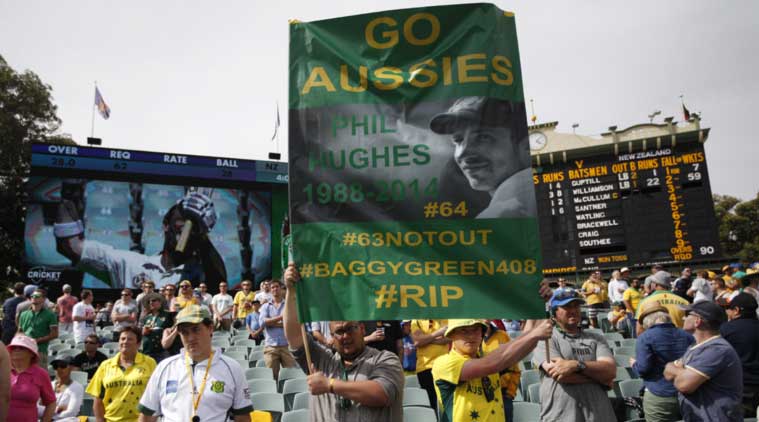An year after death, Phil Hughes lives on in Australia’s memory
 Australia fans at the Adelaide Oval with Phil Hughes banners during the Australia-New Zealand day-night Test match on Friday. (Source: AP)
Australia fans at the Adelaide Oval with Phil Hughes banners during the Australia-New Zealand day-night Test match on Friday. (Source: AP)
Cricket has changed in Australia in the 12 months since Phillip Hughes was felled by a rising delivery that ultimately led to his death.
Hughes, who played 26 Tests for Australia, died three days short of his 26th birthday of a brain hemorrhage on Nov. 27, 2014, two days after he was struck under the rear of his batting helmet by a short-pitch ball while playing for South Australia against New South Wales at the Sydney Cricket Ground.
His death stunned the international cricket community, causing an outpouring of grief from players, officials and from the general public – tens of thousands of fans around Australia showed solidarity in mourning by putting their cricket bats on display outside their homes as a tribute.
While new safety measures such as improved batting helmets are the obvious legacy of Hughes’ passing, others are more subtle but affect the very culture of cricket.
Fast bowlers, by and large, tend no longer to aim to intimidate batsmen with head-high bouncers, and spectators no longer rejoice in pacemen serving up “chin music” or cheer when a batsman is hit.
Recently retired strike bowler Mitchell Johnson, one of cricket’s most feared pacemen, told Australian Broadcasting Corp. television that Hughes’ death made him question the way he played the game.
“I had that (2013-2014) Ashes series where I was really aggressive and bowling a lot of short balls and I did hit players,” he said, reflecting on the summer before Hughes died. The death, he added, “made me think, was I doing the right thing? You know, was I playing in the spirit of the game?”
While Johnson eventually came to terms with his intimidating style, his former teammates agree the game is different now.
A number of senior players have since retired from international cricket, Johnson being the most recent of a line that includes former skipper Michael Clarke, allrounder Shane Watson and wicketkeeper Brad Haddin – who all played in provincial and national teams with Hughes.
“The game has changed for me forever. It’s not what it was,” said recalled spin bowler Steve O’Keefe, who was who was fielding for New South Wales when Hughes was struck.
O’Keefe told a news conference in Adelaide, where Australia will take on New Zealand in the first day-night cricket Test match starting Friday, that his perspective changed.
“You’re playing a game that’s supposed to be fun and you’re supposed to be in a great contest, and then in the blink of a ball it completely changes on you,” he said. “I just hope in my lifetime that I never have to see anything like that again, and we can remember Phil Hughes for what he was, which was a great bloke and an even better player.”
The schedule for Australia’s 2014-15 home series against India was redrafted in the wake of Hughes’ death, with the emotional opening Test played at Adelaide Oval, the same venue where the Australia vs. New Zealand Test will start on the first anniversary of the batsman’s passing.
In that match last year, Australia players wore No. 408 – Hughes’ Test cap number – with black armbands on their shirts. Hughes was 63 not out late on Nov. 25, 2014 when fatally injured at the SCG. The Adelaide Oval crowd offered 63 seconds of applause in his honor before the start of play in the next Test match, and a large number 408 was painted on the field in tribute.
“There was a lot of emotions come this time last year and that’s one thing in the back of a lot of our minds, but at the end of the day we’re coming out here to play a game that we love, and it’s about crossing that line and putting our cricket caps on and thinking about the job ahead,” said opener David Warner, who was a close friend and held Hughes’ hand as the fallen batsman was lifted from the field last November.
“We always know that our mate is looking down on us and we’ll always do our best for him when we walk out in the field, as we have done in the last 12 months. We’ve said from the first Test last year when we played here ‘he’s with us every day.”’
Several low key tributes are planned to commemorate Hughes’s death on Friday, with both the Australian and New Zealand teams expected to wear black armbands and a video montage to be played at 4:08 p.m. during the first scheduled break in play.
New South Wales and Queensland state teams, which open their domestic Sheffield Shield match in Sydney on Friday, will also be wearing black armbands.





